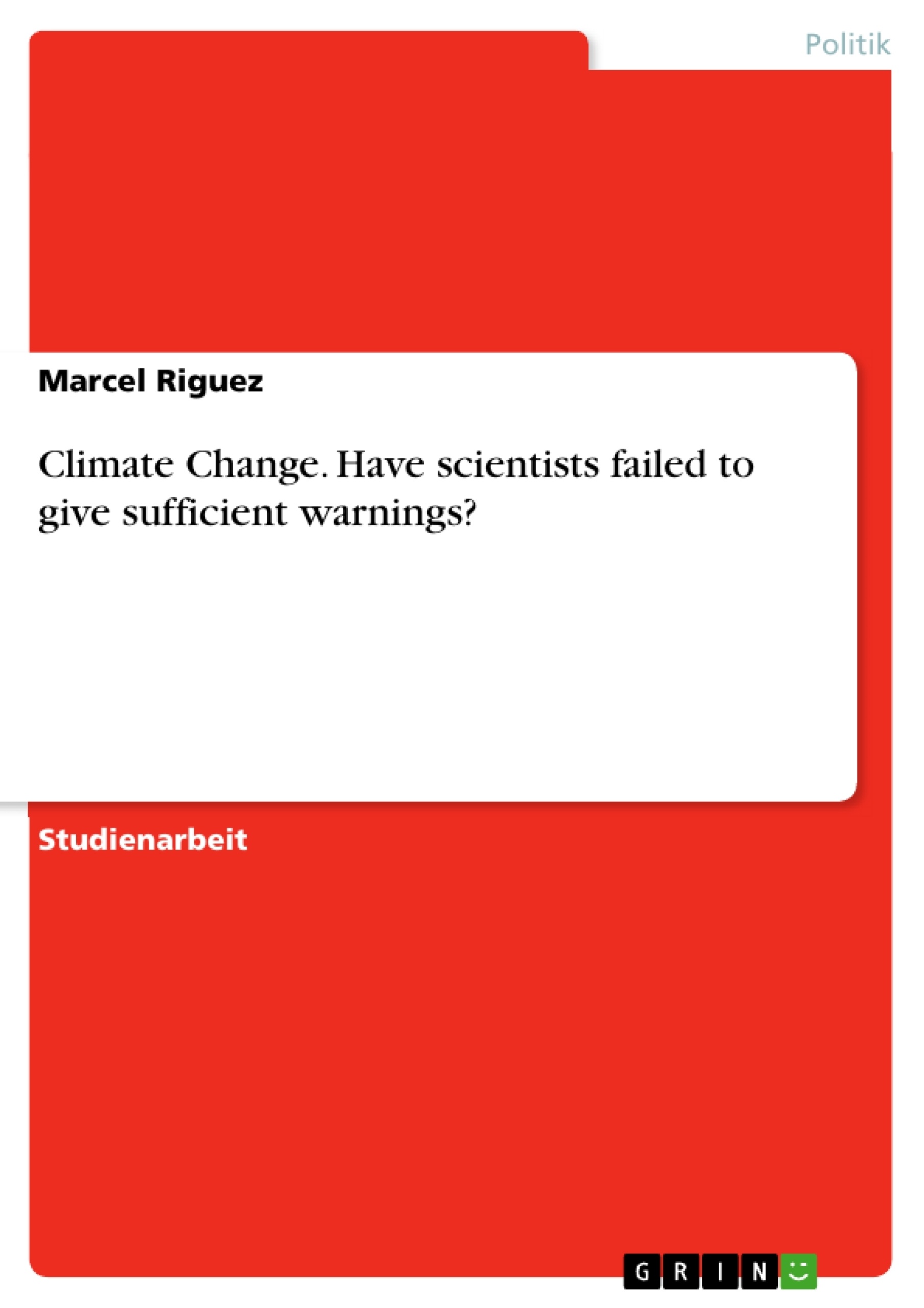This term paper discusses different reasons, why scientists may have failed to give sufficient warnings about climate change and why mankind does not want to listen.
Most scientists are well-meaning and often altruistic. They are looking to find out what is the “truth” in order to explain and help society and nature. If such a person sends urgent warnings because of their research findings, it is fascinating how the public reacts. One evocative reaction comes from Naomi Oreskes and Erik M. Conway’s Book The Collapse of Western Civilization. The narrator is a historian in the future, blaming our society for ignoring the obvious.
Inhaltsverzeichnis
- INTRODUCTION
- THE FOUNDATION: “KNOWLEDGE DID NOT TRANSLATE INTO POWER.”
- LITERAL DECODING.
- PHILOSOPHICAL INTERPRETATION..
- POLITICAL ASPECTS.............
- IPCC, UNFCCC, KYOTO PROTOCOL ..
- CLIMATE CHANGE DENIAL...
- HISTORICAL ASPECTS
- INSTITUTIONAL REASONS.
- PRECAUTIONARY PRINCIPLE..
- CRITICAL LAYPERSONS.
- CONCLUSION…………………………..
Zielsetzung und Themenschwerpunkte
Dieser Essay untersucht, warum es so schwierig ist, die öffentliche Aufmerksamkeit für den Klimawandel zu gewinnen, trotz des wissenschaftlichen Konsenses über seine Existenz und seine anthropogenen Ursachen. Er analysiert die Gründe dafür, warum die Warnungen von Wissenschaftlern häufig ignoriert oder heruntergespielt werden, und beleuchtet die Hindernisse, die einer wirksamen Reaktion auf die Klimakrise im Weg stehen.
- Die Rolle der Wissenschaft in der Kommunikation des Klimawandels
- Politische Aspekte der Klimapolitik und die Auswirkungen von Lobbyismus
- Die Bedeutung des Vorsorgeprinzips und die Notwendigkeit von präventiven Maßnahmen
- Psychologische und soziologische Faktoren, die das Bewusstsein für den Klimawandel beeinflussen
- Die Rolle der Medien und der öffentlichen Meinung in der Debatte um den Klimawandel
Zusammenfassung der Kapitel
Das erste Kapitel führt in die Thematik ein und stellt die zentrale Frage nach den Gründen für die mangelnde Reaktion auf die Warnungen der Klimawissenschaftler. Der Autor vergleicht die aktuelle Situation mit der des römischen und des Maya-Reiches, die trotz detaillierter Aufzeichnungen über drohende Gefahren nicht in der Lage waren, effektive Maßnahmen zu ergreifen.
Im zweiten Kapitel werden die Begriffe „Wissen“, „Übersetzung“ und „Macht“ im Kontext der Warnungen der Klimawissenschaftler analysiert. Der Autor argumentiert, dass es eine Diskrepanz zwischen dem wissenschaftlichen Wissen und der Fähigkeit der Politik und Gesellschaft gibt, dieses Wissen in konkrete Maßnahmen umzusetzen.
Das dritte Kapitel befasst sich mit den politischen Aspekten des Klimawandels und beleuchtet die Rolle von Institutionen wie dem IPCC, der UNFCCC und dem Kyoto-Protokoll. Es wird gezeigt, dass politische Entscheidungen oft durch wirtschaftliche Interessen und ideologische Vorbehalte beeinflusst werden, die der notwendigen Reaktion auf die Klimakrise im Weg stehen.
Schlüsselwörter
Die wichtigsten Schlüsselwörter und Themen dieses Essays sind: Klimawandel, wissenschaftlicher Konsens, politische Reaktion, Vorsorgeprinzip, öffentliche Meinung, Medien, Lobbyismus, anthropogener Klimawandel, globale Erwärmung, nachhaltige Entwicklung, gesellschaftliche Transformation.
Häufig gestellte Fragen
Haben Wissenschaftler nicht genug vor dem Klimawandel gewarnt?
Der Essay untersucht die These, dass Warnungen zwar ausgesprochen wurden, diese aber oft ignoriert oder aufgrund politischer und wirtschaftlicher Interessen heruntergespielt wurden.
Warum wird wissenschaftliches Wissen nicht in politisches Handeln umgesetzt?
Es besteht eine Diskrepanz zwischen Wissen und Macht. Politische Entscheidungen werden oft durch Lobbyismus, wirtschaftliche Kurzfristigkeit und ideologische Vorbehalte beeinflusst.
Was ist das Vorsorgeprinzip im Kontext des Klimawandels?
Das Vorsorgeprinzip besagt, dass bei drohenden schwerwiegenden Schäden mangelnde wissenschaftliche Gewissheit kein Grund sein darf, notwendige Schutzmaßnahmen aufzuschieben.
Welche Rolle spielen Klimawandelleugner?
Die Arbeit beleuchtet, wie gezielte Desinformation und Leugnung dazu beigetragen haben, den gesellschaftlichen Konsens zu schwächen und wirksame Maßnahmen zu verzögern.
Was können wir aus dem Untergang früherer Zivilisationen lernen?
Der Vergleich mit dem römischen Reich oder den Maya zeigt, dass Gesellschaften oft trotz deutlicher Anzeichen für drohende Gefahren nicht in der Lage waren, ihr Verhalten rechtzeitig zu ändern.
Wie beeinflussen Medien die Debatte um den Klimawandel?
Medien spielen eine entscheidende Rolle bei der Vermittlung wissenschaftlicher Erkenntnisse, können aber durch eine falsche „Ausgewogenheit“ (False Balance) den Eindruck erwecken, der wissenschaftliche Konsens sei umstritten.
- Citation du texte
- Marcel Riguez (Auteur), 2016, Climate Change. Have scientists failed to give sufficient warnings?, Munich, GRIN Verlag, https://www.grin.com/document/341277



